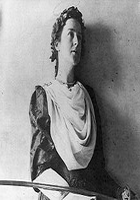Louise Imogen Guiney
Louise Imogen Guiney Poems
I try to knead and spin, but my life is low the while.
Oh, I long to be alone, and walk abroad a mile;
Yet if I walk alone, and think of naught at all,
Why from me that's young should the wild tears fall?
...
In Doric Hall, Massachussetts State House
Dear witnesses, all-luminous, eloquent,
Stacked thickly on the tessellated floor!
...
A man said unto his Angel:
"My spirits are fallen low,
And I cannot carry this battle:
O brother! where might I go?
...
Open, Time, and let him pass
Shortly where his feet would be!
Like a leaf at Michaelmas
Swooning from the tree,
...
Above the wall that's broken,
And from the coppice thinned,
So sacred and so sweet
The lilac in the wind!
...
I
We chose the faint chill morning, friend and friend,
Pacing the twilight out beneath an oak,
...
THERE in his room, whene’er the moon looks in,
And silvers now a shell, and now a fin,
And o’er his chart glides like an argosy,
...
High-hearted Surrey! I do love your ways,
Venturous, frank, romantic, vehement,
All with inviolate honor sealed and blent,
To the axe-edge that cleft your soldier-bays:
...
GOOD oars, for Arnold’s sake,
By Laleham lightly bound,
And near the bank, O soft,
Darling swan!
...
SUCH natural debts of love our Oxford knows,
So many ancient dues undesecrate,
I marvel how the landmark of a hate
...
Across the bridge, where in the morning blow
The wrinkled tide turns homeward, and is fain
Homeward to drag the balck sea-goer's chain,
And the long yards by Dowgate dipping low;
...
The evenfall, so slow on hills, hath shot
Far down into the valley's cold extreme,
Untimely midnight; spire and roof and stream
Like fleeing spectres, shudder and are not.
...
Thabor of England! since my light is short
And faint, O rather by the sun anew
Of timeless passion set my dial true,
That with thy saints and thee I may consort,
...
Waiting on Him who knows us and our need,
Most need have we to dare not, nor desire,
But as He giveth, softly to suspire
Against His gift, with no inglorious greed,
...
She alone of Shepherdesses
With her blue disdayning eyes,
Wo'd not hark a Kyng that dresses
All his lute in sighes:
...
TRUE love’s own talisman, which here
Shakespeare and Sidney failed to teach,
A steel-and-velvet Cavalier
...
The spacious open vale, the vale of doom,
Is full of autumn sunset; blue and strong
The semicirque of water sweeps among
Her lofty acres, each a martyr's tomb;
...
Praised be the moon of books! that doth above
A world of men, the fallen Past behold,
And fill the spaces else so void and cold
To make a very heaven again thereof;
...
The sun that hurt his lovers from on high
Is fallen; she more merciful is nigh,
The blessèd one whose beauty's even glow
Gave never wound to any shepherd's eye.
...
Down the long road, bent and brown,
Youth, that dearly loves a vision,
Ventures to the gate Elysian,
As a pilgrim from the town.
...
Louise Imogen Guiney Biography
Born on January 7, 1861, in Roxbury (now part of Boston), Massachusetts, Louise Guiney was educated at Elmhurst, a convent school in Providence, Rhode Island. To help support her family she began contributing to various newspapers and magazines. Her poems, collected in Songs at the Start (1884) and The White Sail and Other Poems (1887), and her essays, collected in Goose Quill Papers (1885), soon attracted the attention of the Boston literary establishment, and the verse in A Roadside Harp (1893) and the essays in Monsieur Henri (1892), A Little English Gallery (1894), and Patrins (1897) brought her to the center of aesthetic life in Boston. Oliver Wendell Holmes, Thomas Bailey Aldrich, Thomas W. Higginson, and Edmund Clarence Stedman were among her friends and patrons, and on visits to England in the 1890s she met Edmund Gosse, W.B. Yeats, and others. A walking tour of England with her friend Alice Brown in 1895 led to their collaboration on Robert Louis Stevenson--A Study (1895). Her own models in literature were chiefly William Hazlitt and Alfred, Lord Tennyson. When, toward the end of the 1890s, her health and her muse both deserted her, Guiney turned to scholarship, concentrating mainly on the Cavalier poets (a group of mid-17th century English gentlemen poets). From 1901 she lived happily in England. Her later books included England and Yesterday (1898), Martyr's Idyll and Shorter Poems (1899), Hurrell Froude (1904), Robert Emmet--His Rebellion and His Romance (1904), The Blessed Edmund Campion (1908), and Happy Ending (1909, revised 1927), her collected verse. She died at her home in Chipping Campden, Gloucestershire, England, on November 2, 1920. Her unfinished anthology of Catholic poets from Sir Thomas More to Alexander Pope, prepared in collaboration with Geoffrey Bliss, was published as Recusant Poets in 1939.)
The Best Poem Of Louise Imogen Guiney
Irish Peasant Song
I try to knead and spin, but my life is low the while.
Oh, I long to be alone, and walk abroad a mile;
Yet if I walk alone, and think of naught at all,
Why from me that's young should the wild tears fall?
The shower-sodden earth, the earth-colored streams,
They breathe on me awake, and moan to me in dreams,
And yonder ivy fondling the broke castle-wall,
It pulls upon my heart till the wild tears fall.
The cabin-door looks down a furze-lighted hill,
And far as Leighlin Cross the fields are green and still;
But once I hear the blackbird in Leighlin hedges call,
The foolishness is on me, and the wild tears fall!
